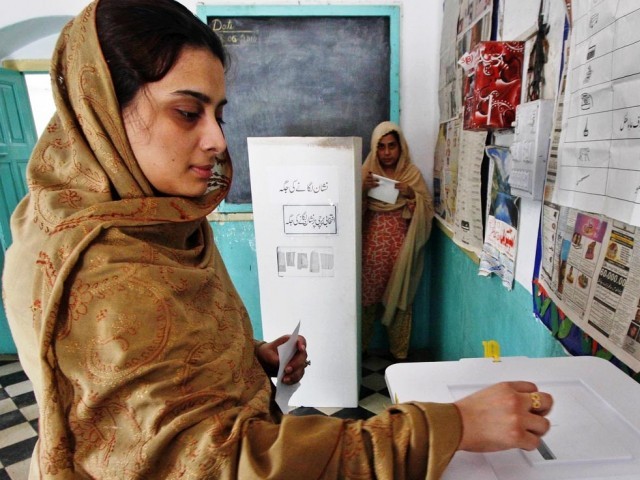
Women should be directly elected to reserved seats under a joint electorate system so that they can create their own constituencies. They should also be allowed to contest on general seats, participants of Mumkin, an alliance of 17 NGOs working to prevent violence against women, said at a discussion on the reduction of the number of seats reserved for women in the forthcoming local government elections, at Shirkat Gah on Tuesday.
The participants said that 33 per cent seats should be retained for women, as provided in the 2001 local government system, at all tiers. The size of the councils should allow participation of at least three or four women.
The alliance demanded party-based elections as “this will help strengthen the political process at the grassroots level”.
They said councillors should be treated equal regardless of whether they were elected to general seats or nominated to reserved seats.
The representation of women from religious minority groups should also be ensured at all tiers. They also demanded quotas for women farmers and workers. Sufficient funds should be provided to local governments for women’s development schemes.
They said a mechanism should be provided to address grievances at the local body level. They demanded 33 per cent representation for women in ancillary bodies and in the Federally Administered Tribal Areas.

Shirkat Gah Advocacy and Communication Director Fauzia Viqar, on behalf of the alliance, said the Local Government Ordinance 2001 had provided 33 per cent seats for women. This had allowed more women to take decisions at the grassroots level. It had also provided a platform to several women who later entered provincial and national level politics, she said.
Viqar added that despite its shortcomings, the 2001 system provided a platform for women politicians to play an effective role despite opposition from men in many areas.
The new local government legislation had significantly reduced the representation of women, Viqar said.
She said the representation of women had been reduced from 33 per cent to 10-20 per cent at various tiers of the local governments in the Punjab and Sindh.
Women will be elected directly on the basis of adult franchise at the lowest tier of government, she said.
Viqar said indirect election for upper tiers of the local government could deprive women, from marginalised groups, of representation.
She said this violated the government’s commitment to incorporate women into the political mainstream; Article 34 of the Constitution, that guarantees participation of women in national life; Article 25 that provides equality of citizens and measures for the protection of women and children; the International Covenant on Civil and Political Rights ratified in 2010 and the Convention on the Political Rights of Women, ratified in 1954.
Salman Abid of the Strengthening Participatory Organisation said the Punjab Local Government Act 2013 provided two seats out of 13 seats for women in union councils. He said this was a drastic decrease from the 33 per cent quota.
The Aurat Foundation, Simorgh, Shirkat Gah Women Resource Centre, Pakistan Catholic Women’s Organisation, National Commission on Justice and Peace, Strengthening Participatory Organisation (SPO), AGHS Legal Aid Cell, Women Workers Helpline, South Asia Partnership- Pakistan, WAR against Rape, Action Aid Pakistan, Home Net Pakistan, Women Empowerment Group, Human Rights Commission of Pakistan, Medecins du Monde-France, ASR Resource Centre and UNIFEM Rep are part of the Mumkin alliance.
Published in The Express Tribune, November 27th, 2013.

1725030039-0/Untitled-design-(2)1725030039-0-165x106.webp)





1732012115-0/Untitled-design-(14)1732012115-0-270x192.webp)









COMMENTS
Comments are moderated and generally will be posted if they are on-topic and not abusive.
For more information, please see our Comments FAQ